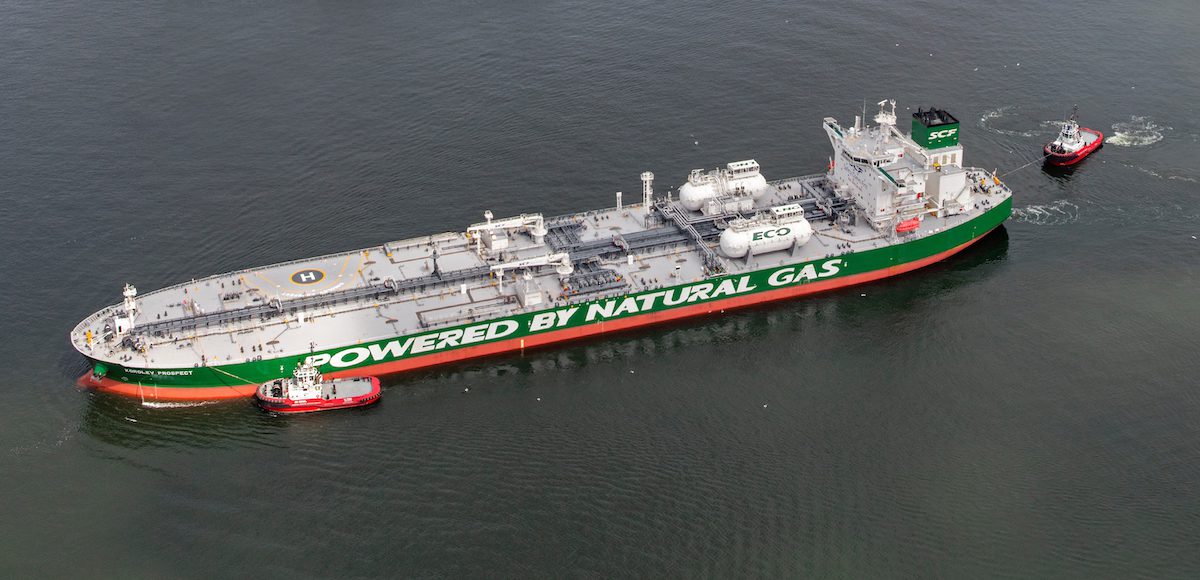File photo of the LNG-powered M/T Korolev Prospect. Photo courtesy SCF Group
 By Shu Zhang and Olga Yagova SINGAPORE/MOSCOW, Oct 2 (Reuters) – Russian oil producer Lukoil has sold a cargo of Varandey Blend crude to a Chinese buyer with the shipment sailing via Arctic waters in an unusual trade flow, according to industry sources and shipping data.
By Shu Zhang and Olga Yagova SINGAPORE/MOSCOW, Oct 2 (Reuters) – Russian oil producer Lukoil has sold a cargo of Varandey Blend crude to a Chinese buyer with the shipment sailing via Arctic waters in an unusual trade flow, according to industry sources and shipping data.
Lukoil’s trading arm, Litasco, sold the cargo to Chinaoil, the trading vehicle of state-owned CNPC, said one of the sources.
Russia, the world’s second-largest oil producer, has been exploring ways to ship more of its crude from the country’s west to Asia, to expand its market share in the east where demand growth exceeds other regions.
Russia is also the second-biggest crude supplier to China, exporting 49.4 million tonnes of oil in the first eight months of 2019 amid closer political and industrial ties between the countries.
In what is the first sale of the Arctic crude grade to Asia via the Northern Sea Route (NSR), the Aframax-sized tanker Korolev Prospect loaded at the northwestern Russian port of Murmansk around Aug. 23 and discharged at eastern China’s Dongjiakou port around Sept. 16, Refinitiv data showed.
The 6,437 nautical mile (11,921 km) journey compares to an estimated voyage of just over 12,506 nautical miles via the Suez Canal, according to Refinitiv data.
Warm weather during the summer allowed the ship to sail through the usually frozen waters of the Arctic, past Alaska, to China, while relatively firmer prices for Russian ESPO crude exported from the Far Eastern port of Kozmino made the economics of the arbitrage trade work, said the two sources.
The vessel crossed the NSR using only cleaner-burning LNG fuel, the first time in history a large-capacity oil tanker has done so, shipping company Sovcomflot said on its website.
The Dongjiakou port is located in Shandong, home to most of China’s independent refiners, aso known as “teapots”, which account for a fifth of China’s crude imports.
Teapots have long favoured Russian ESPO crude since Beijing allowed them to import crude oil directly in 2015.
Varandey Blend is a light sweet grade, similar to ESPO crude. Its sulphur content is around 0.5% and API gravity is around 35-37 degrees, according to Reuters data.
The Varandey Blend arbitrage via NSR has since closed as the weather conditions have changed, the sources said. Shipments may resume next year, according one of the sources, who is familiar with Litasco’s plan.
The price of the cargo was not known.
Lukoil declined to comment. Reuters could not immediately reach CNPC for comment.
(Reporting by Shu Zhang in SINGAPORE and Olga Yagova in MOSCOW, editing by Louise Heavens Editing by Florence Tan and Louise Heavens)
(c) Copyright Thomson Reuters 2019.

 Join The Club
Join The Club











